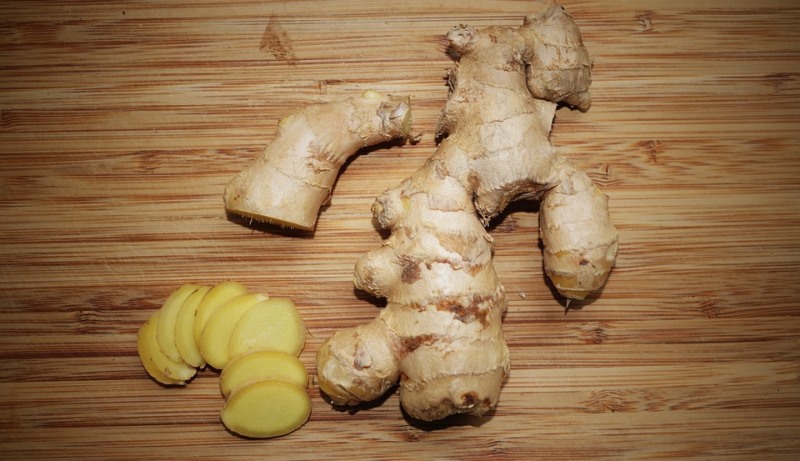Ginger, as you know, is the rhizome of a flowering plant, which is widely used as a spice, and in some folk medicine as well. A rhizome is, in simple terms, a modified underground stem of a plant, which often sends out roots and shoots from its nodes. Ginger is one of the most commonly used spice in the world today. In fact, it belongs to the plant family that also includes turmeric, galangal, and cardamom.
History of ginger

Image source: Pixabay, under Creative Commons License
Ginger is known to have originated in the tropical rainforest in Southeast Asia, specifically on the Indian subcontinent. In the first century AD, ginger made its way into Europe through the lucrative spice trade, and the Romans used it extensively. Indians and Chinese have used ginger to treat many different ailments for over four millennia.
Suggested read: All the numerous health benefits of acai berry you probably didn’t know
Why use ginger
Ginger root has many different chemical compounds, but its therapeutic benefits come from gingerols, which is an oily resin from the root. This resin acts as a highly potent antioxidant and anti-inflammatory agent. These bioactive compounds and other nutrients are known to possess powerful benefits for your brain and body, both.
Ginger has been linked to provide numerous health benefits, including reducing the risk of diabetes, heart disease, obesity, while also promoting healthy hair and complexion. Plus, it has been associated with overall weight loss and increased energy.
Ginger nutritional facts

Image source: Pixabay, under Creative Commons License
Fresh ginger can be used to flavor foods and drinks naturally. Also, ginger is usually consumed in small amounts, which doesn’t add all that much in terms of calories, carbohydrates, fiber, or proteins. Apart from gingerols, ginger root also contains compounds like capsaicin, caffeic acid, beta-carotene, curcumin, and salicylate.
100g of ginger provides 336kcal of energy, along with:
- 6g of carbohydrates
- 3g of natural sugars
- 1g of dietary fiber
- 2g of fat
- 9g of proteins
- Vitamin B3 – 64% of daily value
- Vitamin B6 – 48% of daily value
- Vitamin B2 – 14% of daily value
- Vitamin B5 – 10% of daily value
- Vitamin B1 – 4% of daily value
- Folate – 3% of daily value
- Vitamin C – 1% of daily value
- Manganese – 1586% of daily value
- Iron – 152% of daily value
- Magnesium – 60% of daily value
- Zinc – 38% of daily value
- Potassium – 28% of daily value
- Phosphorus – 24% of daily value
- Calcium – 11% of daily value
- Sodium – 2% of daily value
Health benefits of ginger
Ginger is a superfood, and here are all the health benefits of ginger that make it one.
1. Ginger helps combat indigestion and nausea.
From a simple stomach ache to severe morning sickness, to indigestion, ginger is the go-to ingredient to help ease digestive problems and nausea. Ginger works by relaxing the smooth muscle in the lining of your gut, and helps move food along throughout the system. This is the reason why ginger is so effective against bloating, flatulence, constipation, and other gastrointestinal disorders. For all stomach and gastric disorders, ginger, in the form of fresh juice, consuming it, or inhaling ginger essential oil, are known to work miracles.
2. Ginger helps treat ulcers and GERD (gastroesophageal reflux disease).

Image source: Shutterstock
Ginger is the best cure for stomach ulcers and GERD, because it is more potent than the synthetic drug prescribed to treat these conditions. Also because ginger contains highly powerful anti-inflammatory and antioxidant properties, which help alleviate the symptoms of these stomach conditions.
Suggested read: All the numerous health benefits of broccoli, another superfood
3. Ginger prevents malabsorption of food.
For you to be healthy, the food that you consume needs to go from your mouth through to your colon without getting stuck in between. If it does, it could possibly cause a life-threatening emergency to unstuck the fermenting, or rotting, or worse, obstruction-causing food. If digestion doesn’t happen properly, then its assimilation by your body is affected too. Thus, it causes malabsorption, and your body is the ultimate sufferer of nutrients deficiencies. Hence, ginger is an important dietary necessity. As mentioned above, it helps in promoting regular digestion and metabolism, and is also responsible for strengthening your immune system.
4. Ginger helps respiratory function and boosts immunity.
Ginger helps boost the immune system, and is very effective at warming the body, which in turn helps break down the accumulation of toxins in the organs. Plus, it is known to help cleanse the lymphatic system, which is our body’s sewage system. These toxins, when left to accumulate over longer periods of time, make you susceptible to all kinds of infections, especially related to the respiratory system.
5. Ginger prevents heart disease and stroke.

Regular ginger use has been associated with lowered risk of heart disease and stroke, making it another superfood. Ginger, garlic, and onions, have all been known to possess anti-blood-clotting ability, which makes them a must-have in your daily dietary intake.
6. Ginger helps reduce cholesterol levels.
High levels of LDL cholesterol, the bad kind, are responsible for increasing the risk of heart disease and stroke. And ginger is an excellent food that can help lower the levels of LDL cholesterol and also that of triglycerides in the blood, thereby reducing the risk of heart disease and stroke.
7. Ginger helps fight diabetes.
Gingerols, the powerful compounds present in ginger, are known to natural improve diabetes, while also enhancing insulin sensitivity. Ginger is known to prevent and possibly also reverse diabetes, while also helping protect against and improve diabetic complications like diabetic retinopathy.
8. Ginger fights off bacterial infections.
Ginger has powerful anti-bacterial properties, especially against bacteria that could be contracted in the hospitals. Hence, if you’re going to a hospital for a surgery, or any other procedure, or you’re just visiting someone there, it’s best to take add some ginger essential oil in water and drink it, so as to keep yourself guarded against the harmful infections.
9. Ginger fights off fungal infections.
Fungal infections are notoriously resistant to conventional medicine, but they don’t stand a chance against the power of ginger. Consume ginger regularly to stave off fungal infections of any kind. Make a ginger unguent by mixing together several drops of pure ginger essential oil with tea tree oil and one teaspoon of coconut oil, and apply this to affected areas up to thrice a day.
10. Ginger possesses anti-pain property.

Image source: Pixabay, under Creative Commons License
Ginger contains the compound called capsaicin, which is known to relieve pain, and gingerols act on pain receptors, thus alleviating pain altogether. Although there’s an initial burn, ginger is very effective in relieving pain by reducing the inflammation.
11. Ginger helps fight cancer.

Image source: Pixabay, under Creative Commons License
Ginger has been known in treating ovarian cancer. Ginger is known to induce cancerous cell death, which might even be better than chemotherapy drugs. Apart from helping treat ovarian cancer, ginger is also known to offer numerous benefits that are protective in nature for colon cancer. Consuming ginger helps lower any inflammation of the colon and the intestines, thereby lowering the risk of colon cancer.
12. Ginger possesses powerful anti-inflammatory properties.
This particular property helps in significantly reducing inflammation, which is the cause of many health conditions, including osteoarthritis and rheumatoid arthritis. Ginger has been associated with alleviating discomfort caused by pain and/or swelling in joints due to arthritis. Additionally, it has been known to benefit other inflammation-related conditions like diabetes, Alzheimer’s disease, cardiovascular disease, obesity, and other such conditions.
13. Ginger may help reduce menstrual pain.

Image source: Shutterstock
Menstrual pain, also called dysmenorrhea, is a common occurrence for millions of women across the world. Since ginger is a natural pain reliever, it also helps in relieving menstrual pain. However, it has to be taken at the beginning of the menstrual period for it to be effective.
Suggested read: All the amazing health benefits of the superfood, Chia seeds
14. Ginger helps relieve headaches/migraines.
Ginger, as stated above, possesses excellent anti-inflammatory and antioxidant properties, both of which act against headaches and/or migraines, to alleviate pain. Migraines are essentially caused due to the inflammation of blood vessels in the brain, and ginger helps alleviate it. Plus, ginger also helps combat the accompanying nausea.
These are all the numerous health benefits of ginger, and we hope you’ll add this to your daily dietary intake as soon as possible! Now, let’s take a look at some of the most common ways to use ginger, so that you reap the maximum benefits from it for your health.
- Raw ginger – use it to make vegetable juice, or a smoothie, and drink it every day.
- Ginger tea – most commonly used to get relief from nausea, help ease an upset stomach, and relax the body. Drinking a cup of ginger tea twice or thrice a day helps reduce inflammation. To make it more palatable, you can add honey and lemon juice.
- Ginger powder – dried and ground ginger powder is used in cooking as a spice. Many sweet and savory recipes call for ginger to be used, and ginger powder is one of the easiest ways to add it into a dish.
- Ginger essential oil – this is the most potent form of ginger, because it contains high levels of gingerol. It can either be ingested with water, or dabbed topically with a carrier oil on affected areas. Note that just about 2-3 drops of ginger essential oil is recommended, not more than that.
Featured image source: Pixabay, under Creative Commons License













